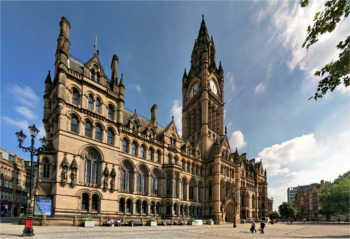Greater Manchester leaders are considering imposing charges on the most polluting vehicles and fines for employers who do not seek to boost sustainable transport use in their workforce.
There are also proposals to charge council workers for using their council office’s parking facilities and prevent them from having personal postal deliveries sent to their offices.
The plans were unveiled in Transport for Greater Manchester's (TfGM) draft Low-emission strategy and air quality action plan, which is undergoing an eight-week consultation.

Manchester town hall
The strategy states that companies could face a ‘financial penalty’, based on the number of car parking spaces they have, for not working to create a travel planning scheme that helps lower emissions for example through boosting modal shift and the uptake of low-emission vehicles.
‘Those companies that do not agree to implement a travel planning scheme may be financially penalised based on the number of employee parking spaces they provide. Therefore, whilst there should be no unreasonable detrimental effects from implementing travel choice schemes, the financial penalty to employers should ensure that it is well-supported,’ the strategy states.
A TfGM spokeswoman told Transport Network that the mechanics of any such penalties would be worked out after the consultation, pending due consideration of the results.
In the public sector TfGM will ‘work with local authorities to review the introduction of parking charges at local authority offices to discourage private car use’.
The document also outlines plans for freight and commercial consolidation centres to help rationalise deliveries in the last section of the journey into the city. Where these are operating, ‘all Greater Manchester councils will stop personal workplace deliveries to council offices’.
Interim mayor of Greater Manchester Tony Lloyd, told Transport Network that the work being done into lowering emissions was ‘laying the foundations for the city to hit its legal [emissions] target by 2020’.
These targets include reducing nitrogen dioxide, which has been linked to thousands of premature deaths, to legal limits. The city also aims to cut annual carbon emissions by nearly 40% from 16 million tonnes to 10 million tonnes by 2020.
Manchester officials highlight that one powerful tool to help achieve this is a Clean Air Zone (CAZ). Under a CAZ vehicles that do not meet specified minimum emissions standards are charged for entering a specific area, with the focus on buses and HGVs.
Mr Lloyd told Transport Network: ‘We have to look at the implications of this [CAZ]. In particular we have to look at imaginative ways of making sure we don’t impact on business.’
He added that TfGM had launched a feasibility study into setting up the zone in the centre of the city, which began in January this year and should be completed by March 2017.
The draft emissions strategy states: ‘The most suitable location for a CAZ would be one based around the centre of the conurbation…If the measure was found to be beneficial, it could potentially be extended to other areas.
‘Emissions within the zone would be reduced but a study will need to assess whether this reduction will be great enough to justify the cost of introducing and operating the CAZ, given that natural fleet replacement will reduce emissions to some extent without any further action.’
Mr Lloyd declined to comment on what benchmarks would be set for implementing the CAZ system, and what level of economic disruption would be acceptable.
The draft strategy states that: ‘A major concern about introducing a CAZ is the impact on the economy, i.e. whether it would drive business and visitors away from the city.’